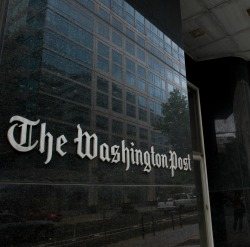DON GRAHAM: For the ten minutes it takes us to speak, no videos, no tweets, no posts, because I’m telling you something that…
[SOUNDTRACK UP & UNDER]
BOB GARFIELD: Washington Post Company CEO Don Graham gathered his staff together on Monday and delivered a bombshell.
DON GRAHAM: We have sold the Washington Post newspaper to Jeff Bezos, founder of Amazon. For those who care, the price is $250 million.
BOB GARFIELD: The shock for those in the room and everywhere else was twofold. First, after 80 years, the Washington Post has become synonymous with the Grahams, whose dedication to journalism at the expense of maximum profitability was the antithesis of modern corporate newspapering. The second jaw dropper was that the new owner is best known for inventing shiny new businesses, not salvaging rusty old ones.
DON GRAHAM: …is famous for patiently investing for years to solve problems, and he’s famous for succeeding in most of those investments. His ownership means, I think, literally the best chance for long-term success for the Post.
BOB GARFIELD: When Graham stood before his assembled staff at 15th and L Street, his announcement blindsided a room of professional information gatherers paid never to be blindsided. Apart from the top management, only Washington Post media reporter Paul Farhi was unsurprised, because after being alerted to the news by editor Martin Baron on Sunday, he had reported the story that was published simultaneously with the staff meeting at 4:33 p.m.
PAUL FARHI: The best way I can liken it is to a funeral, but a funeral where you didn’t know the person had died, in the first place: “Thank you for coming, Grandpa has just died.” This, you know, went over like an anvil had just dropped.
BOB GARFIELD: To Farhi, even the venue for that meeting added to the poignancy of the moment.
PAUL FARHI: We were standing in the community room on the first floor of the Washington Post and back in the day, the day being about 1998, that was where our enormous presses would turn every night, and now this was the site of the announcement about how we’re going to forge ahead into the new media world of the 21st century.
BOB GARFIELD: Let's talk about that, because this is not like e RCA selling to General Electric, a big deal between sort of faceless corporations. There’s a lot of emotion here, a lot of history, and a lot of shared family sacrifice.
PAUL FARHI: That's right. I – you know, the Grahams have been good to us as employees, one, but I think the Grahams have been good for America. That sounds grandiose, but I, I do believe that you can make a very strong case that they have contributed to American society by their contribution to journalism. They’ve backed us as reporters, they’ve backed us in legal trouble, they've put people into places where they could – and some did - get killed. They've been crusaders for essentially the truth.
BOB GARFIELD: I was trying to think of an analogy for how the news would land, King Edward abdicating the throne of England [LAUGHS] or something like that. The best I could come up with was it was a like a mommy and daddy putting you up for adoption, only your parents are doing this unthinkable thing, to save you from the Nazis, in this case, the Nazis being the newspaper economy that has caused the Post to just hemorrhage red ink for years.
PAUL FARHI: No one's dying around here, but that is effectively the kind of choice that we were facing. It's bewildering to have to leave, you know, our parents’ arms into this new thing, but the question is, what were the choices. The choices are all bad, and this may be the least bad choice we have.
BOB GARFIELD: Of all of the people or institutions that could have purchased the Washington Post from the Grahams, what was the reaction to it being this guy?
PAUL FARHI: If Don Graham thinks Jeff Bezos is the guy to take over essentially his child and to raise his child in a good home, then it must be true. He does not have a history of doing things because it will make him a lot of money. But we’re also reporters, and we all want to know more. We all – we’ve looked into him, and there are things that you could say, well, maybe that's not the best background for a newspaper owner. But, again, I, I keep putting my faith in, in Don. He hasn't steered us wrong before and, you know, God willing, he hasn't done it now.
BOB GARFIELD: Paul, thank you.
PAUL FARHI: Thanks very much for having me, Bob.
BOB GARFIELD: Paul Farhi covers media for the Washington Post.
